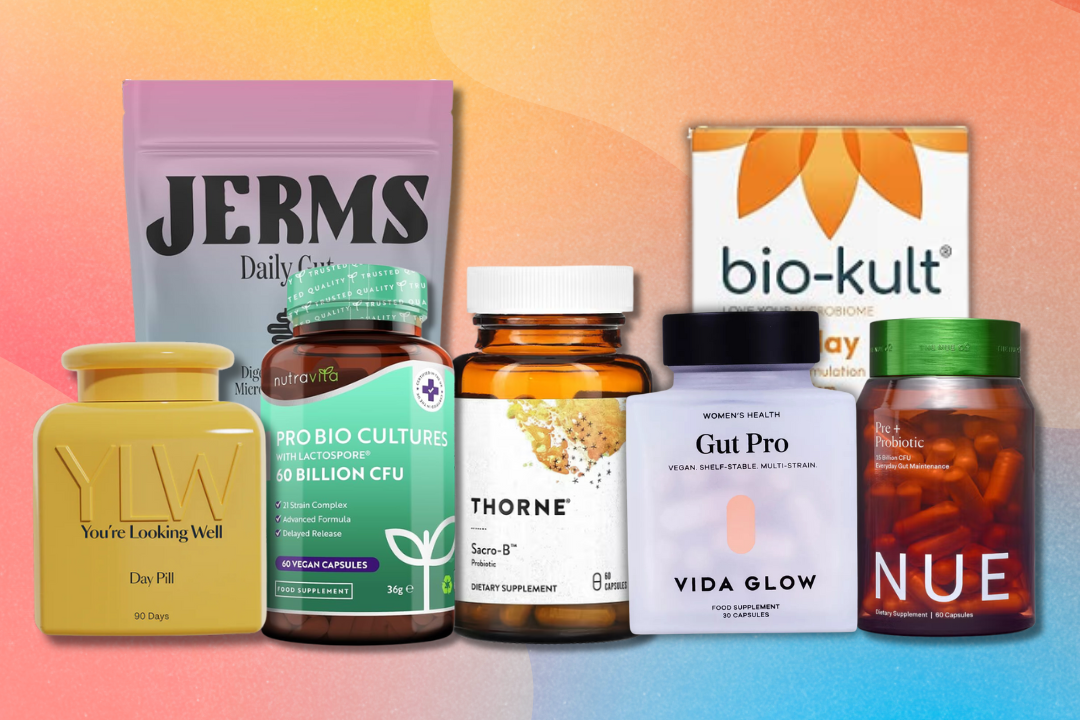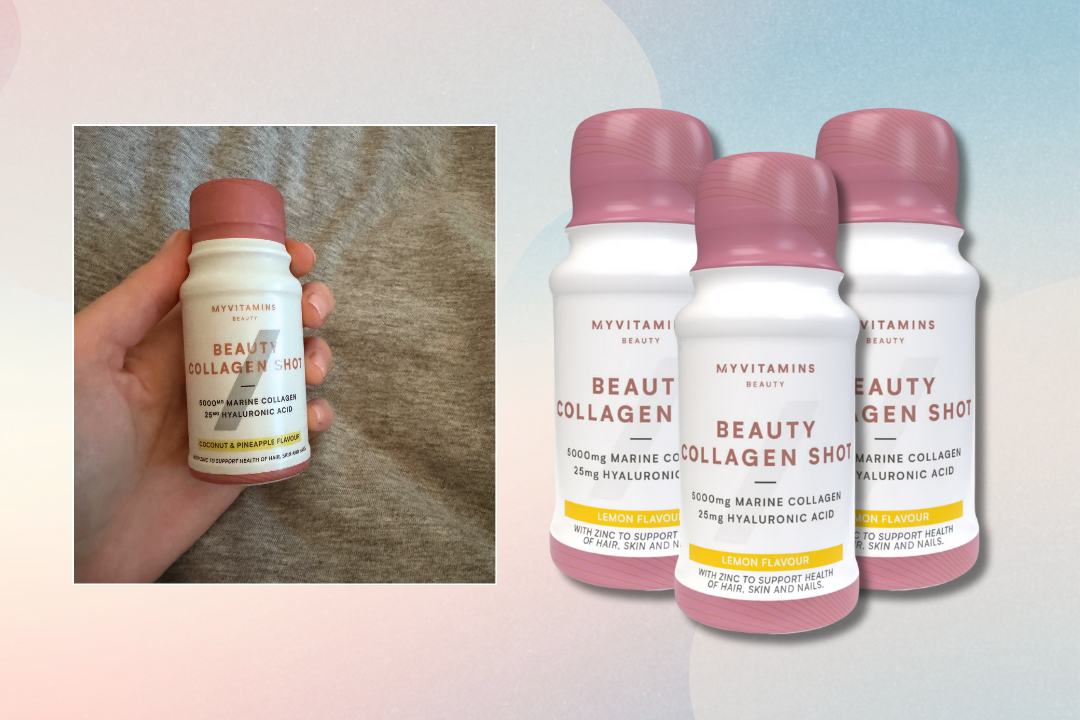
The Independent's journalism is supported by our readers. When you purchase through links on our site, we may earn commission. Why trust us?
11 best gut-health drinks, from kefir to kombucha
Bacteria-boosting drinks can help maintain a healthy gut and your overall wellbeing
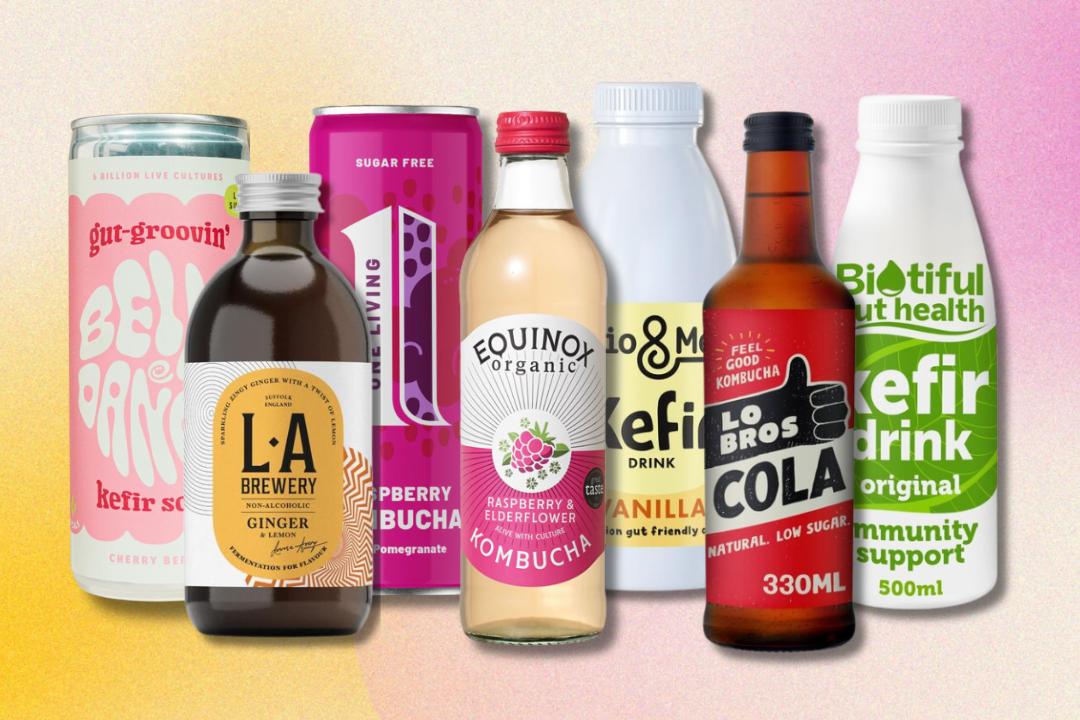
There are several ways to support good gut health – from gut-friendly foods and drinks to prebiotic and probiotic supplements, there are plenty of options to suit your lifestyle, diet and schedule.
Good gut health isn’t just about digestion, it’s essential for overall wellbeing. Studies have shown a gut filled with a large number and variety of “friendly bacteria” supports physical and mental health, as well as making your stomach feel more comfortable. Having a healthy and well-balanced microbiome will help to stave off digestion issues, but it will also boost your mood and help with anything from sleep quality to energy levels.
Tim Spector, professor of genetic epidemiology at King’s College London and author of The Diet Myth: The Real Science Behind What We Eat (£8.99, Amazon.co.uk), explains that one of the best ways to support your gut is to: “Avoid processed and sugary foods and eat a diverse, whole-food diet, rich in plant foods, to feed those microbes.”
Other helpful tactics include taking prebiotic and probiotic supplements and drinking fermented drinks that deliver friendly live bacteria to the gut. Thankfully, there are plenty of drinks like this to choose from and they’re tastier than they sound.
From kefir to kombucha and other bacterial brews, you’re bound to find something that will get your taste buds tingling here, with our line-up of the best on the market.
How we tested
We’ve reviewed the most impressive drinks for gut health, assessing each for flavour, natural ingredients and price. We also looked into whether certain options were suitable for vegans, certified organic or offered options to subscribe and save on repeat deliveries – good gut health is for life, after all.
Each product was tested by gut health expert and co-author of bestselling gut-health book The G Plan Diet (£12.99, Amazon.co.uk), Hannah Ebelthite and by our own fitness and wellbeing editor, Emilie Lavinia. Read on for the best you can buy and where to find them.
The best gut-health drinks for 2025 are:
- Best overall – Equinox elderflower and raspberry kombucha: £2.20, Waitrose.com
- Best budget buy – One Living raspberry kombucha with pomegranate, four pack: £5.25, Sainsburys.co.uk
- Best kefir drink – Biotiful kefir drink: £2.60, Sainsburys.co.uk
- Best small batch kombucha – LA Brewery ginger and lemon kombucha, 12 pack: £36.10, Amazon.co.uk
- Best for vegans – Belly Dance kefir soda, six pack: £17, Drinkbellydance.com
Equinox raspberry and elderflower kombucha

- Best: Overall
- Size: 275ml
- Vegan-friendly: Yes
- Why we love it
- Glass bottle
- Organic
- Take note
- Stronger vinegar taste
Launched in 2012 and based in Yorkshire, Equinox is one of the largest kombucha brewers in the UK and the winner of two Great Taste awards.
The brand’s organic kombuchas are available in five flavours but our favourite is the raspberry and elderflower. You can also choose from pink grapefruit and guava, Sicilian lemon, ginger and orange and yuzu.
Despite a fairly strong taste with distinctly more vinegar than some other brands, this was a favourite with our child testers, who were happy to quaff it in place of less-healthy options.
The glass bottles are easy to recycle – just be sure to give the bottle a gentle shake before enjoying, as the natural sediment from the Scoby (symbiotic culture of bacteria and yeast) will have sunk to the bottom of the bottle.
The individual bottles were also the most competitively priced on test and the tasty flavours and organic vegan-friendly ingredients earned Equinox kombucha the title of best overall drink.
One Living raspberry kombucha with pomegranate, pack of four
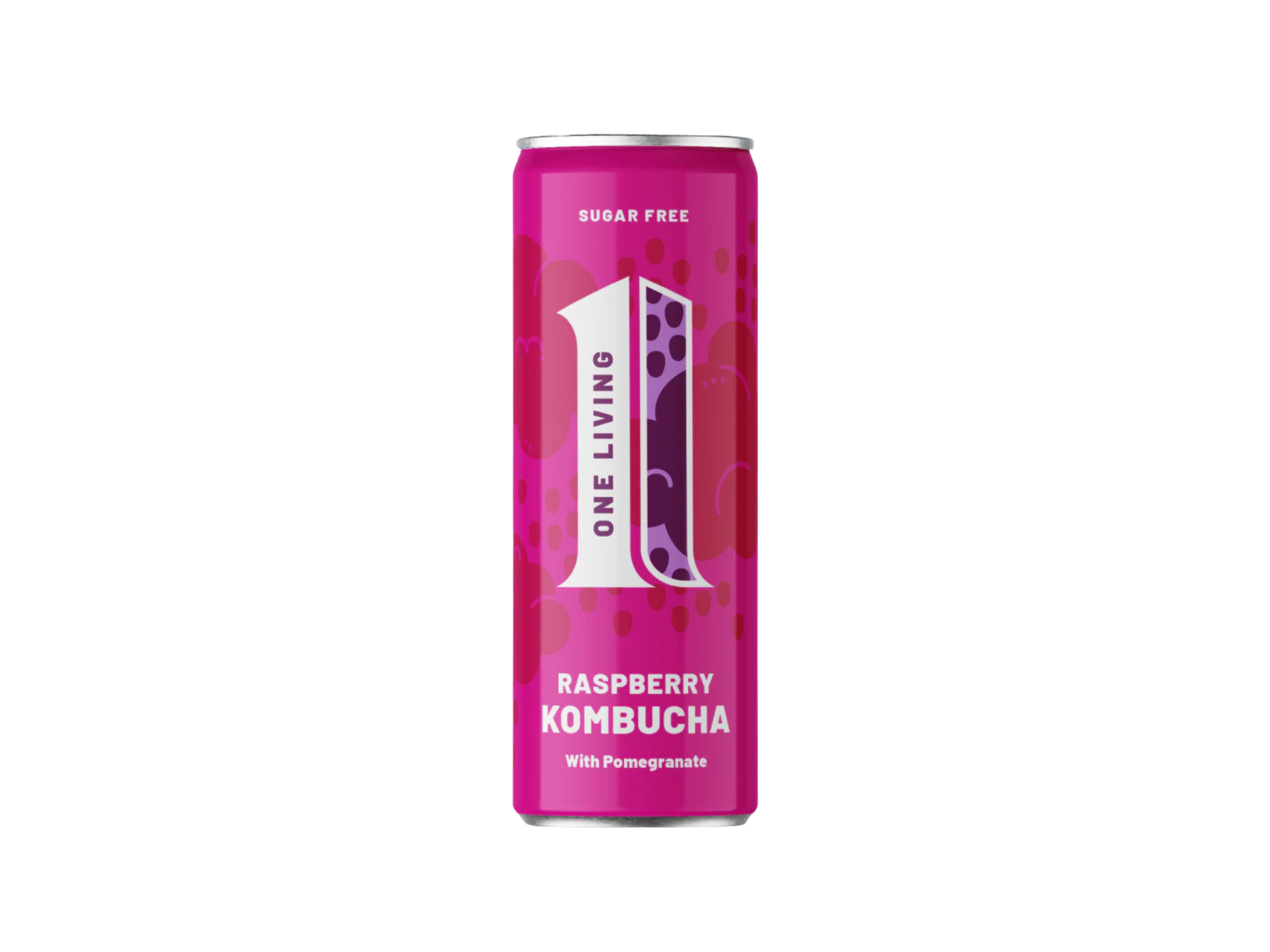
- Best: Budget buy
- Size: 250ml x 4
- Vegan-friendly: Yes
- Why we love it
- Tasty flavours
- Great to drink on the go
- Added B vitamins
If you’re dipping your toe into the world of fermented drinks for the first time, you can’t go wrong with One Living. The brand’s cans of sparkling kombucha are affordable and taste great.
The raspberry kombucha with pomegranate was our favourite but the brand offers a range of flavours – from passionfruit to ginger – as well as blends with added adaptogens for focus, immunity and calm.
Created by Jonny Wilkinson, the gut-friendly brand adds B vitamins to its unpasteurised sparkling drinks, for an extra health hit, and doesn’t add any sugar to its recipes, so you can be sure the friendly bacteria in each can isn’t compromised.
The cans are easy to drink on the go and make a great healthy alternative to fizzy sugary drinks that can throw off your microbiome.
The Gutsy Captain ginger lemon kombucha, pack of 12

- Best: For gut-health at home
- Size: 400ml x 12
- Vegan-friendly: Yes
- Why we love it
- Strong tasty flavour
- Organic
- Take note
- Plastic bottle
An A-list favourite, this organic Portuguese brand has supposedly found fans in Madonna, Gwyneth Paltrow and Justin Bieber.
We found some of the flavours a little odd, and the plastic bottle wasn’t appealing. However, the ginger lemon variety had a refreshing zing and strong, ginger-beer like kick. “A good choice, perhaps, if you’re looking for an alcohol alternative, or the perfect drink to complement a spicy meal.” says gut-health expert Hannah Ebelthite.
At £3.19 for a 400ml bottle, it’s not the cheapest drink on this list but is a great option to have at home in your fridge in place of a family-sized bottle of fizzy pop.
The Gutsy Captain’s kombucha is also vegan-friendly, organic and doesn’t contain any preservatives.
Biotiful kefir drink
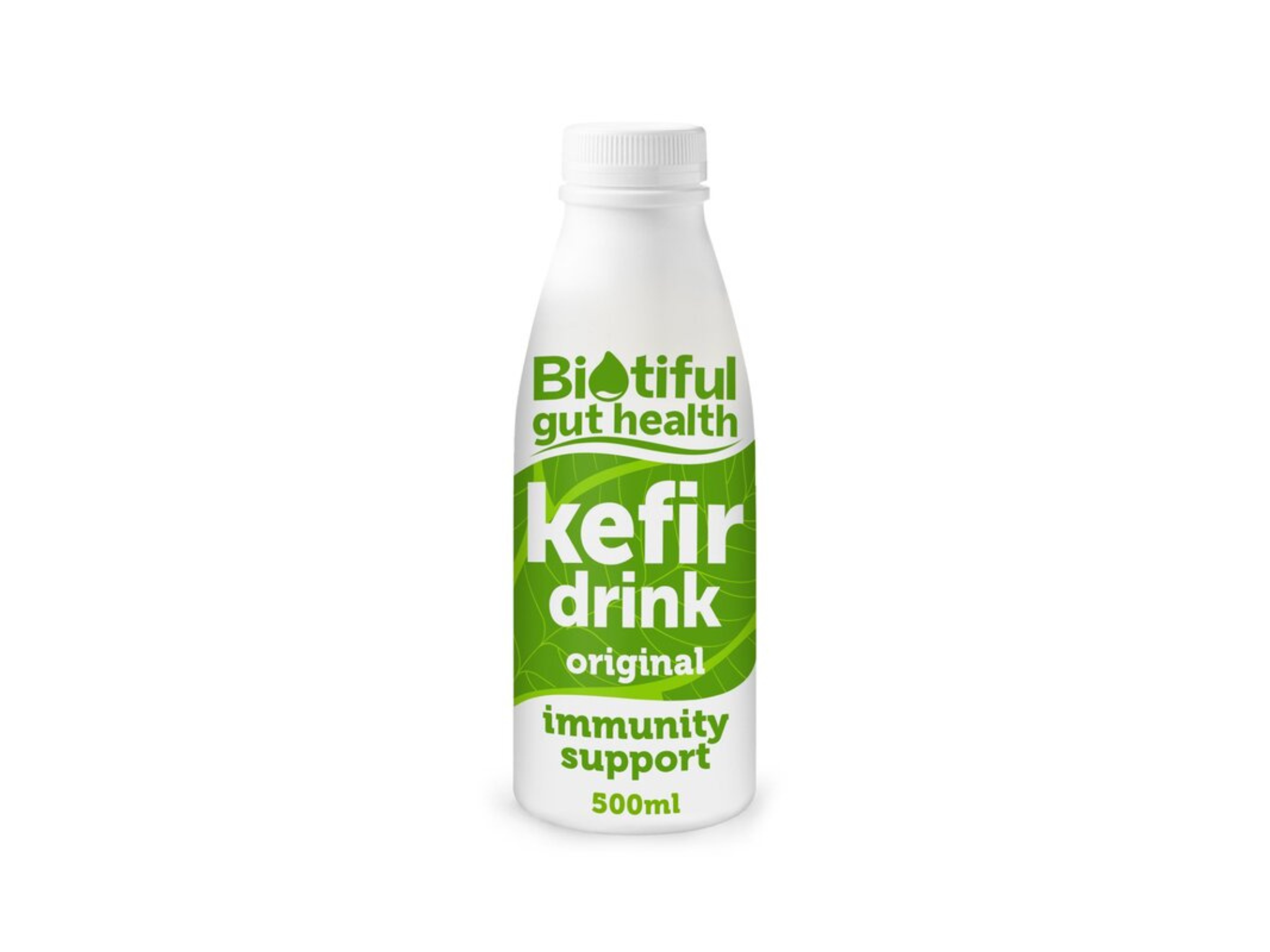
- Best: Kefir drink
- Size: 500ml
- Vegan-friendly: No
- Why we love it
- No added sugar
- Mild tasty flavour
Biotiful Dairy is the UK’s biggest kefir brand and each bottle of the white stuff contains more than 40 strains of bacteria.
There are no added sugars and, as with all kefirs, most of the lactose in these drinks is consumed during the fermentation process, so those who are looking to swerve lactose will still benefit from a gut-healthy hit. However, they are dairy-based drinks and therefore not suitable for vegans.
Drink the plain kefir on its own (the flavour is mild and tangy), add to smoothies or use it anywhere in place of yoghurt or cream – it’s especially good in salad dressings.
If the tangy flavour of plain kefir isn’t to your liking, there are a ton of flavours to choose from, including strawberry, peach, vanilla chai and our fitness and wellbeing editor’s personal favourite: blossom honey.
Biotiful also now offers kefir with added protein for those keen to hit their daily nutrient goals. These protein drinks contain 20g of protein per bottle, so will see you well on your way to your protein quota before or after a heavy gym sesh.
Lo Bros kombucha cola, pack of 12
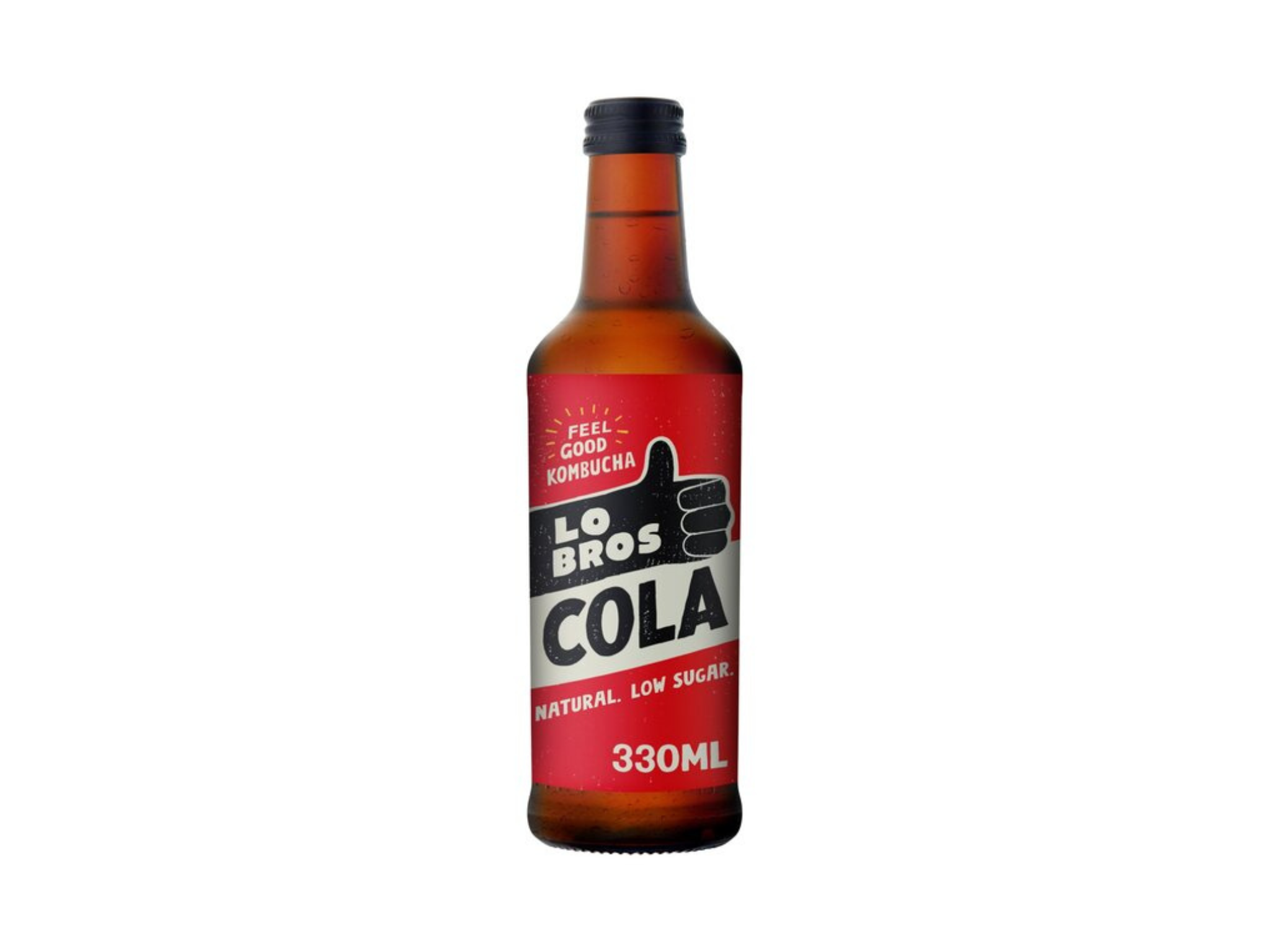
- Best: Alternative to soda
- Size: 250ml x 12
- Vegan-friendly: Yes
- Why we love it
- Healthy alternative to soda
- Contains live cultures
- Take note
- Not a pure kombucha drink
Finally, a healthy alternative to fizzy pop. Lo Bros is an Australian brand that specialises in “living sodas”.
Our favourite of its kombucha drinks is the kombucha cola. According to Ebelthite, “It tastes like old fashioned cola-bottle sweets, without the cloying sensation and huge sugar hit you get from classic cola (or the metallic aftertaste of a diet version).”
The packaging is bright and retro and the huge range of flavours is enticing. However, this is not a pure ’booch. Instead, it’s a blend of kombucha, raw apple cider vinegar and botanical spices and citrus extracts. So, it still packs a gut-healthy punch.
It would look equally at home at a kids’ party or in a hipster bar and is a great healthy vegan drink to enjoy on the go, from a bottle or a can.
Chuckling Goat live kefir

- Best: For soothing inflammation
- Size: 900ml x 4
- Vegan-friendly: No
- Why we love it
- Easier on the stomach than some other options
- Continues to ferment in the bottle
- Take note
- Expensive
This goat’s milk kefir is described by the makers as a medicinal product and comes with clear instructions on building up your dose gradually (from a tablespoon to 170ml daily), to get your body used to the powerful range of bacteria therein.
It’s live and unpasteurised, and continues to ferment in the bottle, producing more and more cultures, so, open it with extreme care.
“Chuckling Goat came about when Welsh goat farmer Shann Nix Jones started exploring the beneficial effects of kefir when used externally on inflammatory skin conditions like acne, eczema, psoriasis and rosacea, and the internal benefits for IBS, depression and anxiety,” explains Ebelthite.
Using goat’s milk rather than cow’s is thought to be easier on digestion and the “fizzy feta” flavour might soon be the highlight of your morning. If not, though, we recommend blending it into a smoothie with some fruit.
A three-week course is recommended, and you can save £5 with a subscription for a delivery every three weeks. This takes a little of the sting out of the price, as it’s £50 for four 900ml bottles, so not the most affordable option in our line-up.
The Collective mango kefir

- Best: For kids
- Size: 500ml
- Vegan-friendly: No
- Why we love it
- Tasty mango flavour
Known for its luxury yoghurt range, New Zealand company The Collective has expanded to include kefir drinks, boasting 13 bacteria strains and 60 billion cultures.
The drinks are available in three flavours as well as natural, and we were most impressed by the mango and turmeric option. If you’re not used to the sour taste of kefir, the mango perfectly masks it and the anti-inflammatory turmeric isn’t overpowering.
A delicious, moreish smoothie that would have the fussiest of kids thinking of this low-sugar, gut-healthy drink as a treat, it works well poured over fruit or cereal, too. Plus, it’s a good source of vitamins B2 and B12, as well as calcium and protein.
Belly dance cherry berry water kefir, pack of six
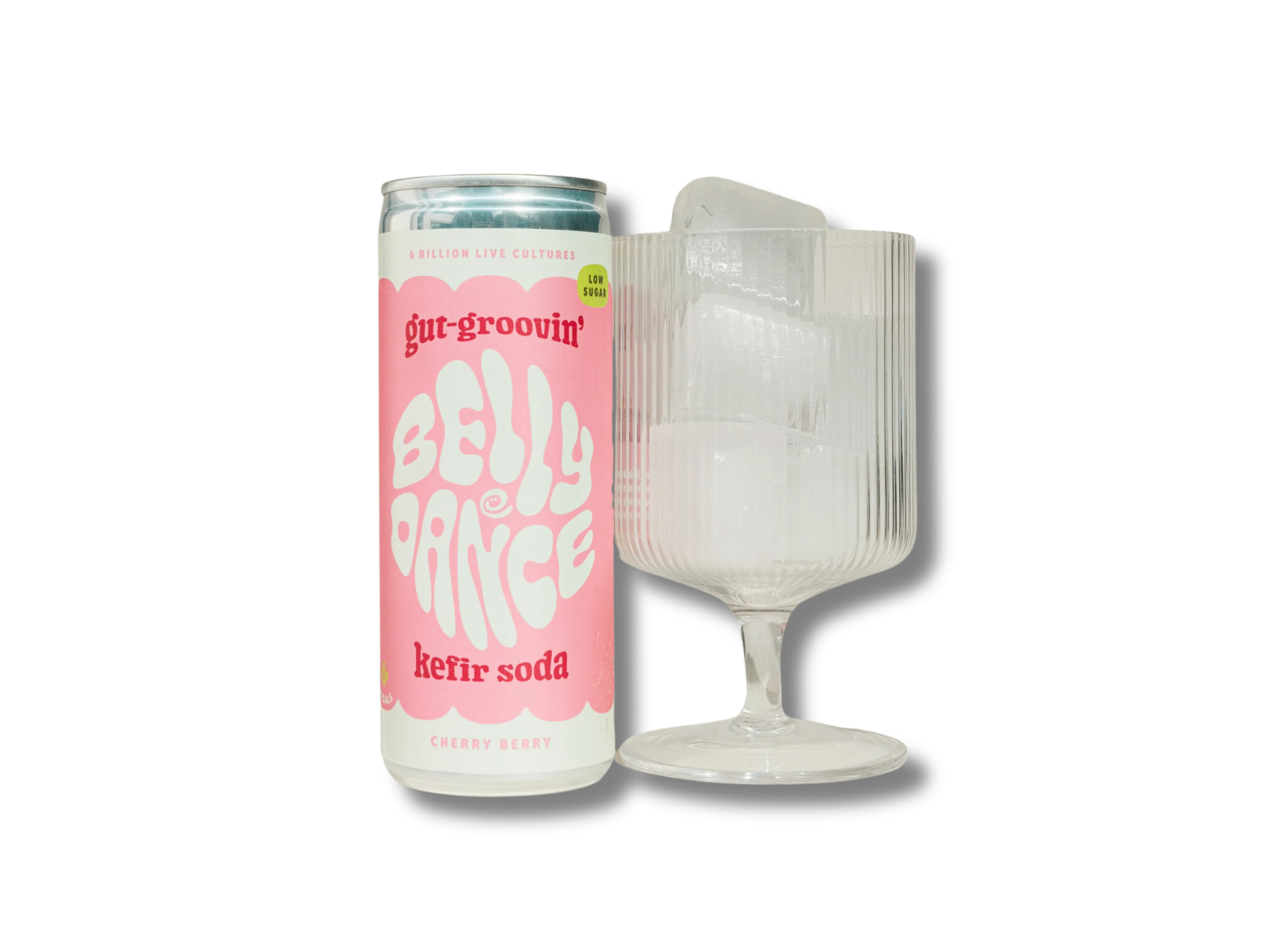
- Best: For vegans
- Size: 250ml x 6
- Vegan-friendly: Yes
- Why we love it
- Tasty fruity flavours
- Dairy-free kefir
- Added vitamins and antioxidants
If you’re looking to try kefir but you don’t consume dairy, look no further than water kefir. This soda is a gut-friendly kefir that’s suitable for vegans and those following a dairy-free diet.
Available in two flavours, the cherry berry took the top spot for us but fans of citrus might prefer the kiwi mango flavour.
Along with friendly live cultures, the kefir grain fermentation process also provides vitamins and minerals along with antioxidants and organic acids that have gut-soothing, anti-inflammatory properties.
Unlike kombucha, this fizzy drink contains no caffeine and it’s also low in sugar, making these cans a healthy way to enjoy a can of soda and a simple way to boost gut health.
LA brewery ginger and lemon kombucha, pack of 12
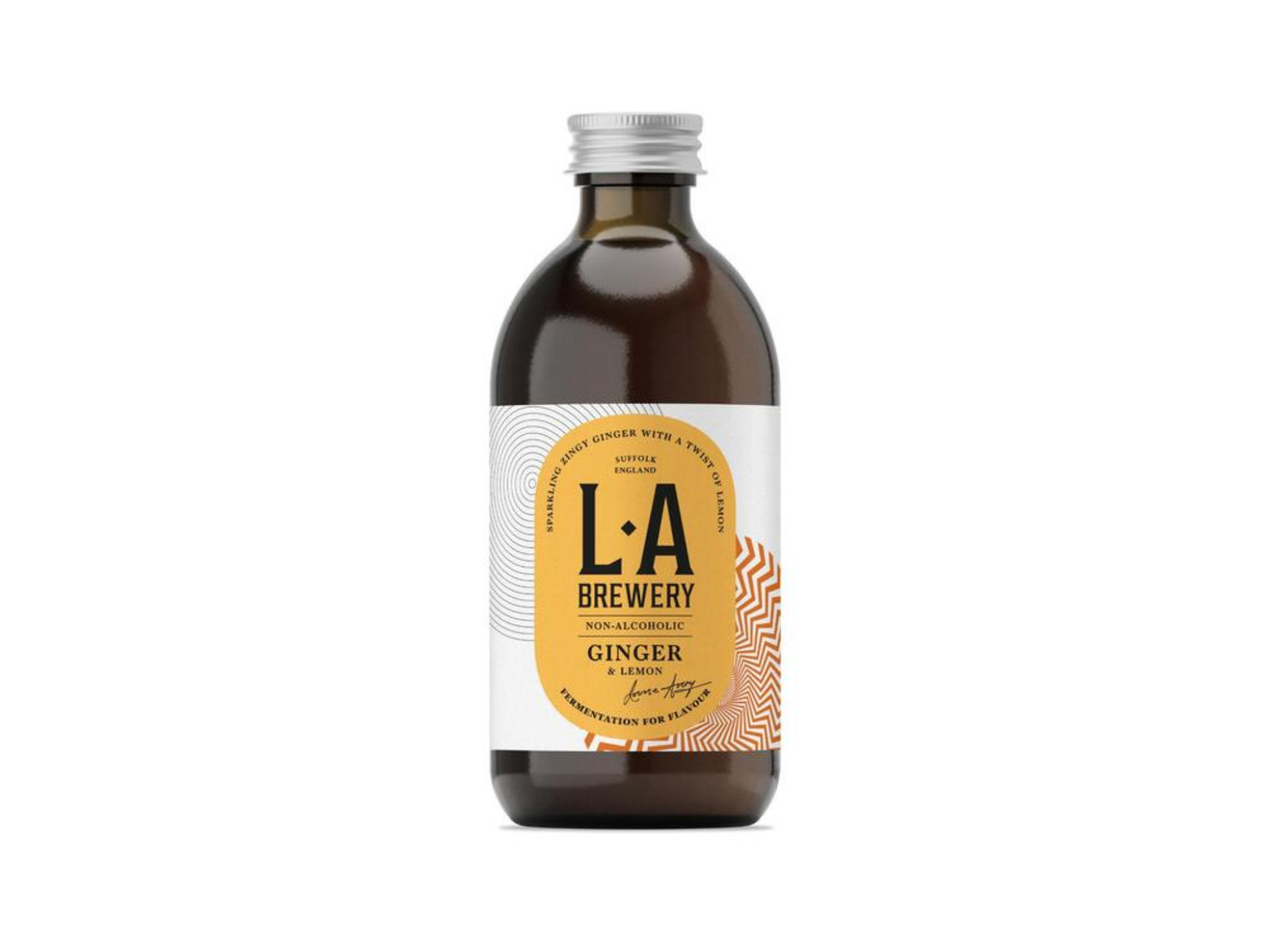
- Best: Small-batch kombucha
- Size: 330ml x 12
- Vegan-friendly: Yes
- Why we love it
- Ethical B-Corp Certified brand
- Recyclable glass bottles
- Pure strong flavour
This craft kombucha comes in weighty glass bottles that have a luxury feel to them. One of our fitness and wellbeing editor’s go-to brands, LA brewery is a B-Corp Certified microbrewery based in Suffolk, UK – not Los Angeles, as you might imagine.
The brand says the tea used to make the kombucha comes from ethical tea farms and is lovingly turned into a gut-friendly drink in the UK. Our favourite flavour is the lemon ginger, which is rich and flavourful with a hint of chili.
This kombucha, like Equinox’s, has a purer, more vinegary taste than other brands and will need a little shake to get the floating Scoby pieces moving before drinking.
The bottles are easy to recycle and come in packs of 12, so you can stock up your fridge and enjoy them daily.
Bio and Me vanilla kefir
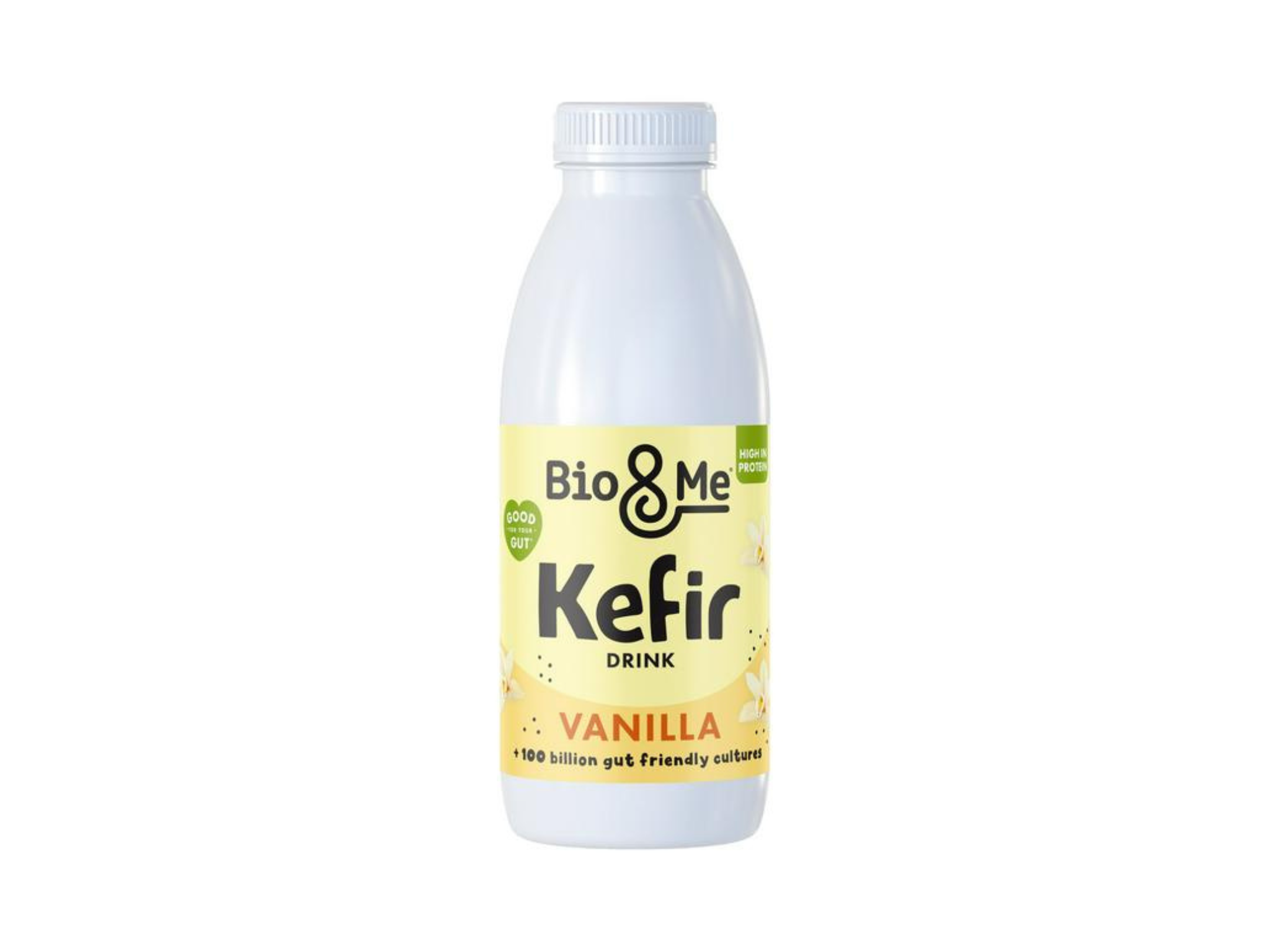
- Best: Flavoured kefir
- Size: 500ml
- Vegan-friendly: No
- Why we love it
- Tasty vanilla flavour
- More than 100 billion live cultures
- Source of calcium and B vitamins
Another quality kefir brand that’s easy to find in supermarkets, Bio and Me specialises in dairy-based gut health drinks that taste great.
With no added sugar, each bottle contains 18 unique live culture strains and more than 100 billion gut-friendly cultures, so, it’s a safe and effective bet from an affordable drink.
Made using milk, it’s not suitable for vegans but for those who do consume dairy, it’s delicious alone or poured over cereal. Our favourite is the vanilla flavour, which is sweet and subtle, masking most of the tang without damaging the live cultures inside.
It’s also a good source of calcium and B vitamins, so makes for a promising way to start the day.
Fix8 strawberry basil kombucha, pack of 12
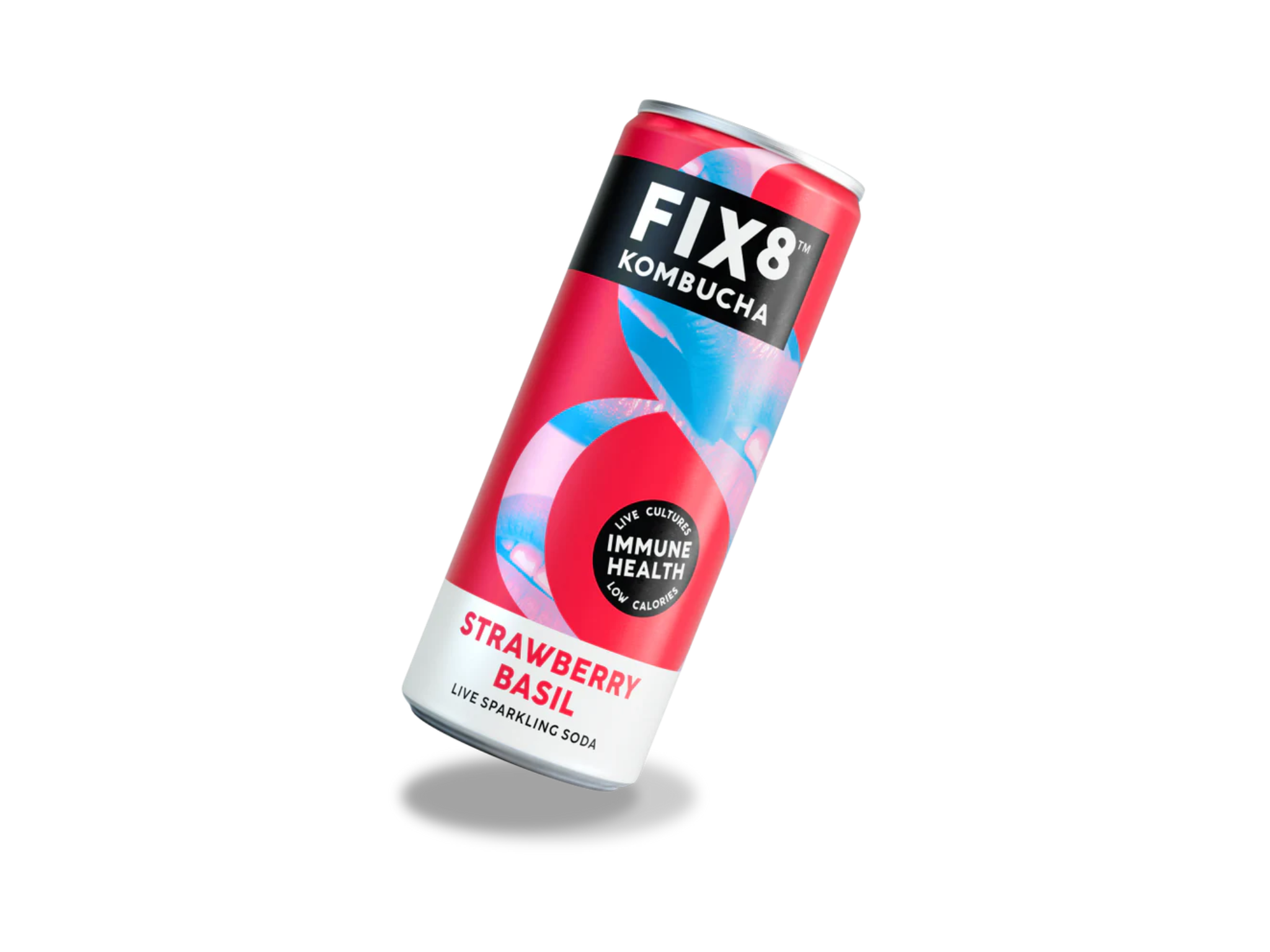
- Best: For flavours
- Size: 250ml x 12
- Vegan friendly: Yes
- Why we love it
- Delicious flavours
- A dose of Vitamin C
- Affordable
If fruity flavours are your weakness, Fix8 might be the kombucha brand for you. Available in strawberry basil, Sicilian citrus and ginger turmeric, these cans are slow brewed with added live cultures. They also contain 25 percent of your recommended daily Vitamin C, so they’re a great all rounder for all ages.
The natural flavours pair brilliantly with the discernable but not unpleasant tang of the fermented tea and despite being one of the most delicious, at just under £22 for 12 cans, this is one of the more affordable options if you’re keen to try kombucha.
The strawberry basil is our personal favourite but all three options are a great gut-friendly treat from this independent brand.
Gut-health drink FAQs
What is kombucha?
Kombucha is created when tea and sugar are fermented using a Scoby (symbiotic culture of bacteria and yeast). The resulting drink is fizzy, very slightly alcoholic (usually less than 0.5 per cent) and, while some of the sugar remains, most is consumed by the bacteria, which can be visible in the drinks as stringy bits that are perfectly safe to consume.
Most kombucha products contain between 2g and 4g sugar per 100ml, compared with more than 10g for juice or cola. Kombucha drinks will also contain caffeine, however, it’s worth taking a look at the label when you’re looking for a quality kombucha. This drink has skyrocketed in popularity and some brands offer a healthier and more gut-friendly formula than others.
Avoid added sugar and artifical flavours, as these can counteract the good bacteria in the drink. Kombucha is a safe bet for people following a plant-based diet but for anyone who might be sensitive to (or trying to avoid) alcohol or caffeine, it might be worth exploring other gut-friendly options.
What is kefir?
Kefir is usually made by adding live kefir grains to milk and allowing them to ferment. The result is a slightly effervescent, thick, tart milk drink that tastes like a stronger version of natural yoghurt – and can contain up to 10 times the number of bacterial strains.
Kefir made with milk contains dairy and is therefore not suitable for vegans or plant-based eaters, however, water kefir is suitable for non-dairy diets. Water kefir is a version of the drink made without any milk and usually comes as a sparkling soda.
If you’re looking for a gut-healthy drink that will work for you, there are a few things professor Tim Spector advises: “Look for billions rather than millions of colony-forming units (CFUs) on the label, to maximise the amount that makes it to the gut,” he suggests.
“Everyone’s microbiome is unique, like a fingerprint, so, we can’t yet promise that certain strains will boost yours. The best advice is to mix up the drinks you have, for maximum diversity. Fermented products do their work as they pass through you, so, have them little and often, rather than occasional binges.”
The verdict: Gut-health drinks
Gut health drinks are plentiful and easy to find but it really depends on what you’re looking for when it comes to finding the right one for you. For those looking for a tasty hit of live cultures without the addition of dairy, a water kefir soda such as Belly Dance’s could be right up your street. However, if you don’t mind the hint of caffeine, you’ll love Equinox’s fruity organic kombucha offerings, which took our top spot. For an affordable first try, the One Living kombucha cans are the perfect entry point. However, if you don’t find dairy scary, kefir is packed with live cultures and makes for a delicious breakfast option. We loved the plain kefir from Biotiful as a healthy all-rounder.
Want more recommendations? Check out our guide to the best probiotics
Voucher Codes








